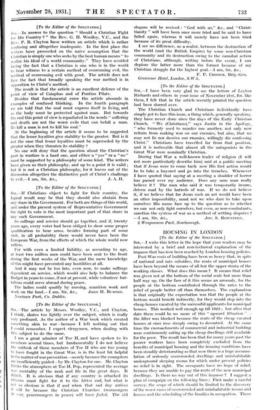[To the Editor of the SPECTATOR.] Sm.—In answer to the
question " Should a Christian Fight for His Country ? the Rev. G. H. Woolley, V.C., and the Rev. P. B. Clayton have written an article which is rather confusing and altogether inadequate. In the first place the writers have proceeded on the naive assumption that the Christian is simply one who seeks by the best human means " to realize his ideal of a world community." They have avoided facing the fact that a Christian is one who is in the world to bear witness to a certain method of overcoming evil, the method of overcoming evil with good. The article does not face the fact that broadly speaking the war method is in opposition to Christ's method.
The result is that the article is an excellent defence of the point of view of Caiaphas and of Pontius Pilate. Besides that fundamental error the article abounds in examples of confused thinking. In the fourth paragraph we are told that the soul must express itself in living, and so the body must be protected against man. But towards the end this point of view is repudiated in the words " suffering and death are not the worst evils that can befall a man. To kill a man is not to kill his soul."
At the beginning of the article it seems to be suggested that the lesser loyalties give stability to the greater. But is it not the case that lesser loyalties must be superseded by the greater when they threaten its stability ?
No one will deny that the question about the Christian's part in warfare is a hard one, and either a "yes" or a "no" must be supported by a philosophy of some kind. The writers have given us their philosophy, and up to a point it is valid ; but it is not a Christian philosophy, for it leaves out of the discussion altogether the distinctive part of Christ's challenge






































 Previous page
Previous page